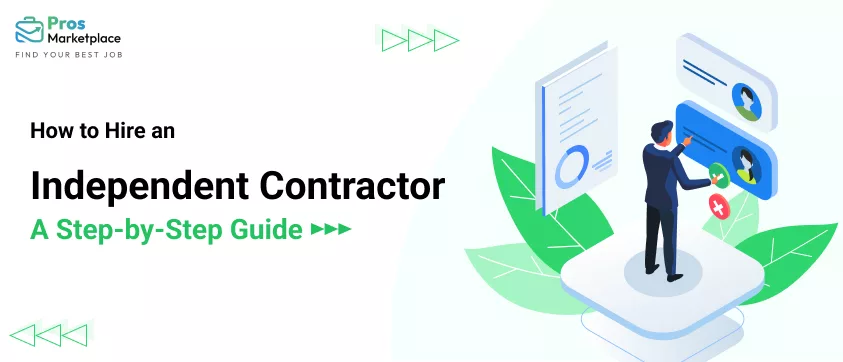Hiring an independent contractor is the most strategic move for any business in terms of flexibility, specialized skills, and cost savings.
The process of finding and engaging the right contractor can, however, be quite complicated. This guide breaks down the process. So it will be easier to understand everything necessary to make informed decisions and build strong working relationships.
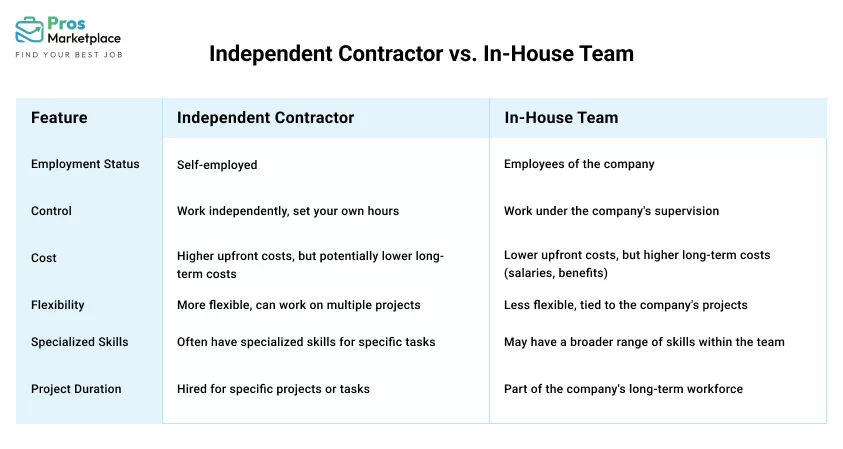
Understanding the Role of Independent Contractors
Independent contractors are self-employed people who offer specific services for single projects to businesses. Unlike employees, they are responsible for taxes, benefits, and work schedules on their own. This ability to work with different clients at the same time also provides specialized skills without hiring full-time employees.
Yet, on the reverse, misclassification of a worker can result in legal action and financial liability. The IRS has a few criteria that set apart an independent contractor from an employee. Below are the main areas the IRS emphasizes for workers’ compensation.
Key Points
- Control: Independent contractors must have control over their work performance
- Financial Responsibility: The contractors usually bring their tools and analyze the risks and rewards for key expenses
- Relationship Duration: The relationship must be project-based rather than a continued one
Defining the Scope of Work
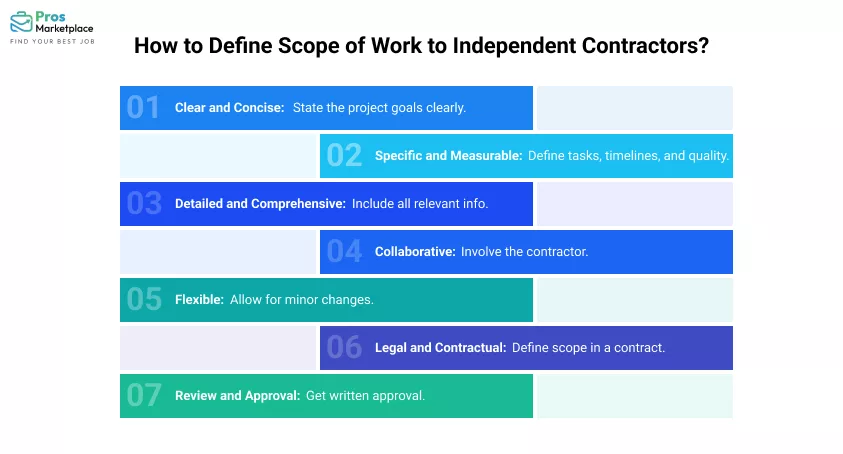
Clearly define the needs of the project before contacting any potential contractors. Define the scope, deliverables, timeline, and budget. A well-defined scope of the project provides a base for selecting the right contractor. It will be beneficial for both parties to have aligned expectations of what is in and what is out under the project.
Let’s start by defining the objectives of the task at hand. What specific jobs are you calling for? What background or level of professional experience is needed to carry out the job efficiently? If the work is to be done in phases, divide the deliverables step-by-step and set deadlines for each.
Moreover, a budget must be clearly stated—remember to include the contractor’s labor fees along with any miscellaneous expenses that apply.
Scope Definition Tips
- Specify the objectives and deliverables of the project.
- Take into account the technicality of the tasks involved.
- Present the timeline of the project, including the milestones.
- Set a budget, which aligns with market rates and the complexity of the project.
Finding the Right Contractor
Once you have defined the project scope, the next stage is to find the correct contractor or freelancer. It’s a big task because there are a lot of them bringing services to the market. The key factor is to find professionals with proven records, experience, and, most crucially, communication styles to match a business.
Start by tapping into your network. Personal recommendations work better than anything when it comes to finding a good contractor. You can also use online platforms such as Upwork, Freelancer, and LinkedIn. These let you post your project requirements and select the ones that fulfill your needs. However, while making the right choice don’t forget to check the reviews or ratings of the contractor by past clients. This will give you better insight into the reliability of the contractor.
Steps to Find the Right Contractor
- Research – Use personal networks and online media.
- Make your shortlist – Based on experience, skills, and reviews.
- Interview – Review the project scope, expectations, and previous work
Request samples of past work or case studies that demonstrate the relevant work
Evaluating contractors
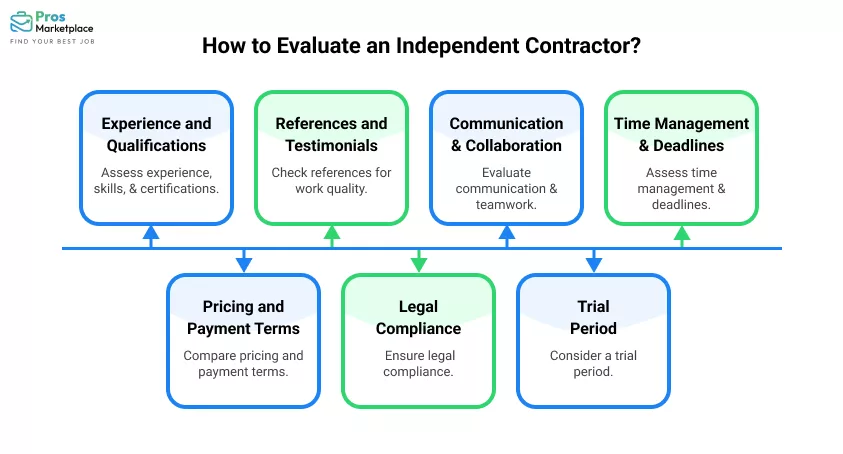
After you shortlist potential contractors, an evaluation process follows. This will consist of going through their portfolios and conducting interviews, to see how the contractor approaches your project. During the interview, ask a few direct questions that are relevant to the type of experience they have working on similar projects, and then ask what their style of problem-solving is. That alone will give you plenty of information on how they approach issues and what form of communication they use.
Review their portfolio or previous work, which will give a clear idea of the potential of the person and whether work quality is up to the mark expected from you. Further to this, cross-checking references from previous clients proves decisively valuable in determining reliability, work ethic, and meeting deadlines.
Key Evaluation Criteria
- Experience: Experienced in the area you need help with.
- Portfolio: Assess the body of work in terms of quality and style.
- References: Speak to past clients about their performance.
- Communication: How they communicate should align with your business.
Negotiating The Contract
Once you have found the appropriate contractor, it is time to discuss the terms of the contract. The written contract should outline and explain the project scope, deliverables, deadlines, terms of payment, and any straightforward terms or conditions. The degree to which misunderstandings and disputes can impact or harm the two parties relates directly to the degree of clarity and precision of the contract.
Discuss the type of payment the contractor is comfortable with. Some are okay with hourly payments, while some go for work orders. Discuss payment terms and agree on payment against milestone completion or at the end of the whole project. It is also recommended that a provision for changes in the project plan scope and associated handling and billing mechanism be incorporated.
Tips for Successful Contractor Management:
- Define the scope of work, the deadlines, and the deliverables.
- Define the terms of payment and schedule.
- Include the terms of the contract for changes in scope and additional work.
- Clearly define the intellectual property rights.
Managing the Contractor in the Best Way
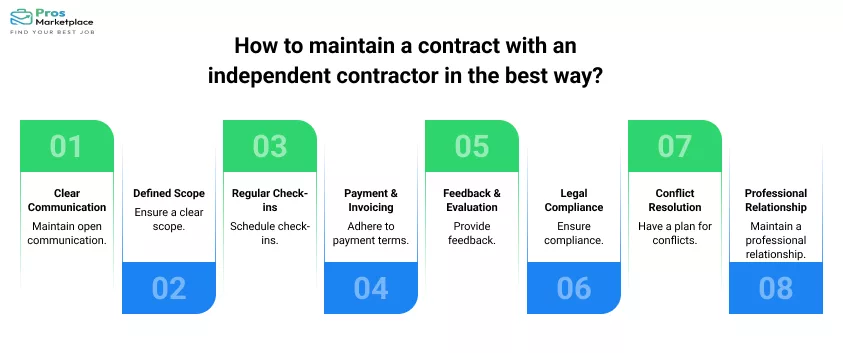
The focus here is on the management of effective employees or independent contractors for the sake of a project’s success. Even though they may be independent, make sure to communicate frequently and provide feedback so that the project remains on course. Schedule regular check-in meetings to discuss progress, talk about any issues that might be in the way, and maybe change course.
Autonomy must be balanced with the level of oversight. There is trust that the contractor will work, but at the same time, they will be supported in any way required to keep the project going. Address any issues in good time to prevent any delays or misunderstandings in the process.
Best Practices for Managing a Contractor
- Regular Communication: Schedule regular check-ins to go through progress and address challenges.
- Provide Feedback: Give feedback to the work in a manner that will help ensure the project delivered meets expectations.
- Respect Autonomy: Allow the contractor to work on their own, but still be available for any support required.
Ending the Project
At this point in your project, with completion nearly finished, it is the appropriate time to review the final deliverables to the agreed-upon standards. This is also when you shall make your final payment to them, and therefore, it is critical to undertake thorough scrutiny before signing off on this project.
If there are any changes, tell them beforehand and allow them time to make these changes before making the final payment. When satisfied with the work, make the full payment, and if the contractor has done the job to your satisfaction, please leave a review or a testimonial.
How to Finalize the Project
- Review the Project: Ensure all the work meets the standards you agreed upon.
- Request Revisions: If there is any need for final amendments, please request them.
- Finalize Payment: Pay as per the contractor agreement.
- Provide Feedback: Give feedback or a testimonial to the contractor.
Conclusion
Hiring an independent contractor can give your business the needed expertise and flexibility to accomplish specialized projects efficiently. A more successful and efficient outcome of this process can be ensured by following these steps in the collaborative endeavor: a complete understanding of the position, the definition of projects, finding and appraising the appropriate contractor, engagement in negotiations with the best contract, managing the relationship and closely working with the contractor.
